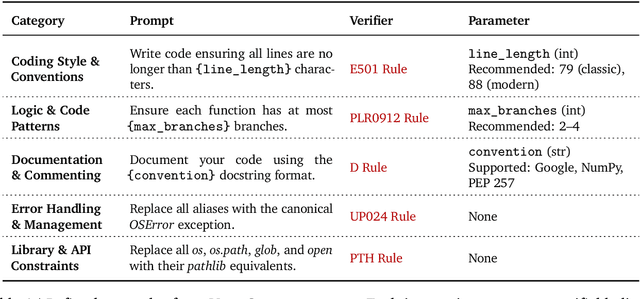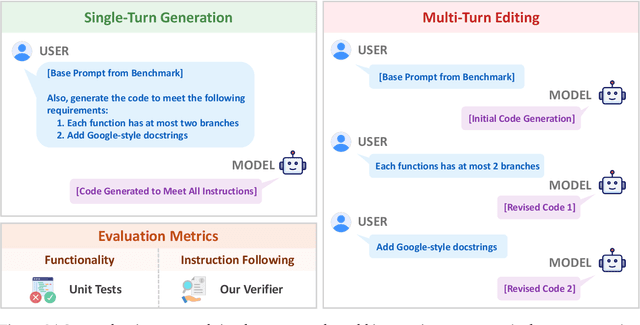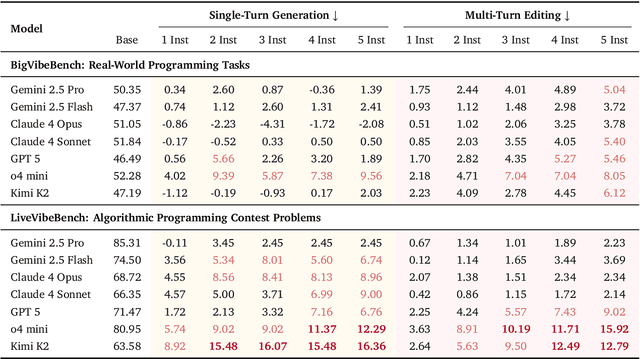Qingze Wang
Vibe Checker: Aligning Code Evaluation with Human Preference
Oct 08, 2025



Abstract:Large Language Models (LLMs) have catalyzed vibe coding, where users leverage LLMs to generate and iteratively refine code through natural language interactions until it passes their vibe check. Vibe check is tied to real-world human preference and goes beyond functionality: the solution should feel right, read cleanly, preserve intent, and remain correct. However, current code evaluation remains anchored to pass@k and captures only functional correctness, overlooking the non-functional instructions that users routinely apply. In this paper, we hypothesize that instruction following is the missing piece underlying vibe check that represents human preference in coding besides functional correctness. To quantify models' code instruction following capabilities with measurable signals, we present VeriCode, a taxonomy of 30 verifiable code instructions together with corresponding deterministic verifiers. We use the taxonomy to augment established evaluation suites, resulting in Vibe Checker, a testbed to assess both code instruction following and functional correctness. Upon evaluating 31 leading LLMs, we show that even the strongest models struggle to comply with multiple instructions and exhibit clear functional regression. Most importantly, a composite score of functional correctness and instruction following correlates the best with human preference, with the latter emerging as the primary differentiator on real-world programming tasks. Our work identifies core factors of the vibe check, providing a concrete path for benchmarking and developing models that better align with user preferences in coding.
Re-Invoke: Tool Invocation Rewriting for Zero-Shot Tool Retrieval
Aug 03, 2024



Abstract:Recent advances in large language models (LLMs) have enabled autonomous agents with complex reasoning and task-fulfillment capabilities using a wide range of tools. However, effectively identifying the most relevant tools for a given task becomes a key bottleneck as the toolset size grows, hindering reliable tool utilization. To address this, we introduce Re-Invoke, an unsupervised tool retrieval method designed to scale effectively to large toolsets without training. Specifically, we first generate a diverse set of synthetic queries that comprehensively cover different aspects of the query space associated with each tool document during the tool indexing phase. Second, we leverage LLM's query understanding capabilities to extract key tool-related context and underlying intents from user queries during the inference phase. Finally, we employ a novel multi-view similarity ranking strategy based on intents to pinpoint the most relevant tools for each query. Our evaluation demonstrates that Re-Invoke significantly outperforms state-of-the-art alternatives in both single-tool and multi-tool scenarios, all within a fully unsupervised setting. Notably, on the ToolE datasets, we achieve a 20% relative improvement in nDCG@5 for single-tool retrieval and a 39% improvement for multi-tool retrieval.
Gemini: A Family of Highly Capable Multimodal Models
Dec 19, 2023Abstract:This report introduces a new family of multimodal models, Gemini, that exhibit remarkable capabilities across image, audio, video, and text understanding. The Gemini family consists of Ultra, Pro, and Nano sizes, suitable for applications ranging from complex reasoning tasks to on-device memory-constrained use-cases. Evaluation on a broad range of benchmarks shows that our most-capable Gemini Ultra model advances the state of the art in 30 of 32 of these benchmarks - notably being the first model to achieve human-expert performance on the well-studied exam benchmark MMLU, and improving the state of the art in every one of the 20 multimodal benchmarks we examined. We believe that the new capabilities of Gemini models in cross-modal reasoning and language understanding will enable a wide variety of use cases and we discuss our approach toward deploying them responsibly to users.
 Add to Chrome
Add to Chrome Add to Firefox
Add to Firefox Add to Edge
Add to Edge